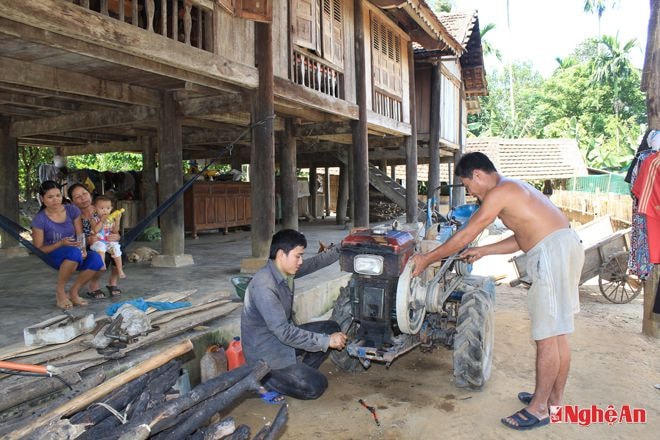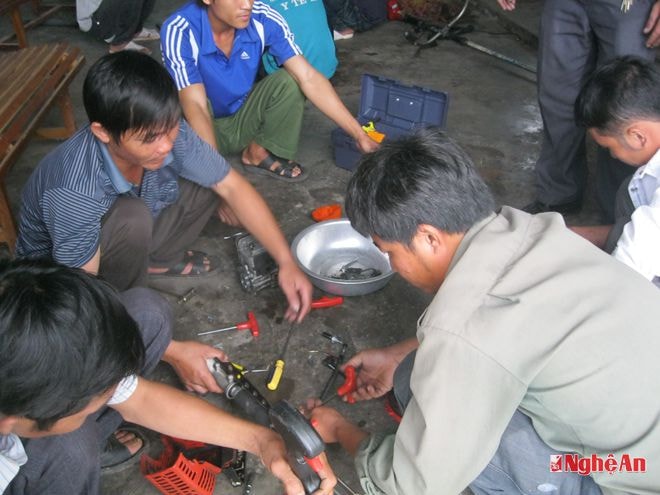Bringing mechanization into agricultural production: Farmers lack mechanics!
(Baonghean) - After 2 years of promoting "land consolidation" according to Directive 08 of the Provincial Party Committee Standing Committee, the application of mechanization in production has been actively implemented by farmers in the province with a series of agricultural machinery and equipment increased. However, repairing and replacing spare parts of these equipment when damaged is still a "difficult" problem for many farming households.
According to the latest statistics of the Department of Agriculture and Rural Development, by the end of 2014, the whole province had 13,654 multi-function plows, 8,888 hand-held harvesters, 75 transplanters, more than 10,000 motorized rice threshers, nearly 4,000 sprayers, 9,200 machines in aquaculture, 123 agricultural dryers, etc. This shows that machines are playing an increasingly important role in agricultural production in our province, truly demonstrating the effectiveness of replacing human labor, increasing productivity and labor efficiency. At the same time, there is a great need for repairing and replacing spare parts when these machines are damaged.
 |
| Mr. Lang Van Duong in Binh 2 village, Chau Binh commune (Quy Chau) repairs his own tractor to serve production. Photo: Nguyen Son |
Yen Thanh district is the largest rice granary in the province and is also where farmers have successfully applied many scientific and technical advances to agricultural production, including the mechanization process. Coming to Lien Thanh commune, I met Mr. Vu Huu Vinh who was transporting a broken plow to a repair facility. He said: "My house is in Bao Thanh commune, more than 10 kilometers away. Every time the machine breaks down, I have to bring it down here to repair it. Nowadays, people use a lot of plows and transplanters, but there are very few places to repair them." According to Mr. Vinh, there is still an on-site machine repair service, but the efficiency is not high. Repairmen cannot bring enough tools and equipment to replace and repair the machine without knowing the specific "disease" of the machine. Therefore, during the "tense" season, sometimes the machine breaks down and stays in one place for many days, which is very frustrating."
Visiting the agricultural machinery repair facility of Mr. Phan Hoang Tien (Lien Giang hamlet, Lien Thanh commune). From the beginning of the alley to his workshop, there are many machines, from plows, transplanters to harvesters, threshers, ... and a series of spare parts. Workers at the facility continuously come to receive machines brought by farmers from neighboring areas. Mr. Tien said: "I opened the repair workshop in 2008, when agricultural machinery began to be widely used by people. Up to now, in the whole district, there are not many repair facilities like mine. On average, every day, our workshop repairs about 10 machines of all different types. During the crop season, there are days when we have to urgently repair dozens of machines, continuously until midnight to have enough machines for people to use." Mr. Tien added that for common breakdowns, the repair price ranges from 100,000 to 150,000 VND/machine. After paying 4 regular workers from 5 to 6 million VND/person/month and the cost of purchasing spare parts, he earns hundreds of millions of VND each year from this profession. "People are using more and more machines, so the need for repairs is very high. I am letting my youngest son study mechanics and repair right at the workshop to develop the profession," said Mr. Tien.
In Thanh Chuong district, after land consolidation, people have brought many types of machinery into agricultural production such as plows, transplanters and tea pickers, but this locality lacks repair facilities. When broken, these machines have to "wait in long lines" for repairmen, missing people's production time, affecting productivity and causing waste of money. Mr. Le Dinh Thanh, Head of Thanh Chuong Agriculture Department said: "With equipment with simple structures, if you learn basic skills such as changing oil, replacing screws, etc., people can still repair them themselves. As for large capacity machines with complex designs, repairs require the skills of local skilled workers or support from machine suppliers."
 |
| Students learn to repair agricultural machinery at the Nam Dan HN-DN Center (photo provided by the Nam Dan HN-DN Center) |
Will businesses accompany farmers and what is the best solution to the above situation? When asked about this issue, Mr. Phan Duy Thieu, Deputy Head of the Planning and Finance Department, Department of Agriculture and Rural Development, said: “Many farmers have financial capacity but limited technical capacity. When they have money and need, they buy machines but do not thoroughly understand the operating mechanism as well as basic knowledge about machines, leading to frequent machine breakdowns and farmers being stuck in the repair process. To contribute to solving this problem, in parallel with supporting and encouraging farmers to buy machines, the province has also assigned 6 businesses in the area to supply and be responsible for maintaining and servicing people's machines. These businesses have organized training sessions, instructed on how to use machines, and applied periodic warranty policies, depending on each type of machine.” According to Mr. Thieu, since 2015, the connection between the government and enterprises selling agricultural machines has been assigned to the district, but the province still recommends that machines should be purchased from these establishments to ensure the rights of the people. On the other hand, farmers themselves also need to accumulate experience, improve their technical knowledge to operate machines better to prolong the life of the machines, and at the same time be able to repair minor damages themselves.
In response to the above trends and needs, implementing the Prime Minister's Project 1956/QD-TTg on "vocational training for rural workers by 2020", many vocational training centers have also included agricultural machinery repair in their teaching. At the Nam Dan District Vocational Training Center, this major was officially introduced in 2012. Since then, the number of students has increased. Mr. Hoang Nguyen Tu - Deputy Director of the Center said: "Although this major has just opened, the number of students registering is quite large, each year there are 1-2 classes, each class has about 30 students. Depending on the policies of superiors and the actual needs of students, in the coming time, the center will adjust the training of the major accordingly."
Learning a trade and accumulating experience in repairing agricultural machinery not only helps farmers maximize the efficiency of the machine, but can also help them improve their technical skills, become skilled workers who can open repair facilities right in their locality, which is a positive and practical direction in the current situation of increasingly developing agriculture, where every household actively applies scientific and technical advances, promoting mechanization in production.
Phuong Thao
| RELATED NEWS |
|---|






